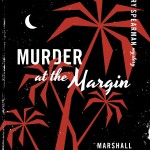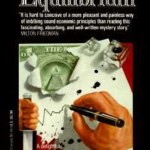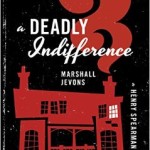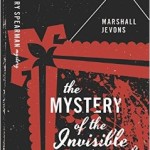“Marshall Jevons” is the pseudonym of two economics professors: William L. Breit (Trinity University) and Kenneth G. Elzinga (University of Virginia). Their amateur sleuth, Henry Spearman, is a Harvard University economics professor (modeled on Milton Friedman). Spearman solves murders by using economic principles. For example, in the first book in the series–Murder at the Margin (1978)–Spearman solves a series of murders (a retired General and a sitting Supreme Court Justice) with a couple economic principles like the Prisoner’s Dilemma. My favorite mystery in this series is The Fatal Equilibrium (1985) where an associate professor at Harvard is murdered because of his attempts at securing an academic promotion. Concepts like “opportunity costs” and “marginal utility maximization” come into play. The Fatal Equilibrium became the first mystery novel to be published by a university press (MIT). The third book in the Henry Spearman series, The Deadly Indifference (1995) involves real estate and academic history.
William Breit died in 2011, but his writing partner just published The Mystery of the Invisible Hand (2014) where Henry Spearman unravels the death of an artist. Yes, these books are a bit gimmicky. But the economics behind the plots is sound and I found them entertaining. You might, too.




Fascinating. I don’t think I’ve ever heard of these. I’m picturing Paul Krugman solving mysteries a la Columbo.
Jeff, “Marshall Jevons” modeled their economist, Henry Spearman, on Milton Friedman: short and bald. An economist based on Paul Krugman would be a more dashing figure!
I don’t remember hearing about these, either. Interesting concept.
Bill, some college economic classes use these economic mysteries as supplements.
Yes, these sound pretty gimmicky to me. My reading schedule for the year is already filled, so maybe another year…
Rick, if you’re going to only read one of the Henry Spearman books, I’d recommend THE FATAL EQUILIBRIUM. It’s my favorite of the four volumes.
George, I’m with the others. I hadn’t heard of Marshall Jevons either. I like the economics setting to these mysteries; possibly a first of its kind.
Prashant, “Emma Latham” wrote about a banker whose knowledge of finance helped him solve crimes, but I’m not aware of another mystery that features an economist.
I was going to mention the Emma Lathen books too. I liked them quite a lot when I read them (in the 1970’s) but I’m not sure how well they would hold up today.
Jeff, I’ve been considering some of the Emma Latham books for FFBs in 2015.
I can’t think of much that interests me less than economics, but a good enough writer can make any subject fascinating, I suppose.
Kelly, some people find money fascinating. I’m more interested in the human behavior. For me, economics is just applied psychology.